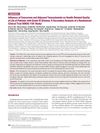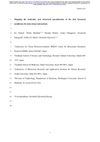 8 citations,
April 2019 in “ACS Biomaterials Science & Engineering”
8 citations,
April 2019 in “ACS Biomaterials Science & Engineering” The new SIS-PEG sponge is a promising material for skin regeneration and hair growth.
 8 citations,
March 2018 in “Expert Review of Respiratory Medicine”
8 citations,
March 2018 in “Expert Review of Respiratory Medicine” Inhalation therapy may repair and protect elastin in the lungs of COPD patients.
 8 citations,
July 2017 in “Biochemical and biophysical research communications”
8 citations,
July 2017 in “Biochemical and biophysical research communications” A new compound, BOI, can help hair grow by changing hair cycle phases and increasing certain cell contents.
 8 citations,
January 2013 in “Medicinal chemistry”
8 citations,
January 2013 in “Medicinal chemistry” The compound 4c showed strong potential as an anticancer agent.
 7 citations,
January 2019 in “Annals of dermatology/Annals of Dermatology”
7 citations,
January 2019 in “Annals of dermatology/Annals of Dermatology” Synthetic ceramides may help hair growth by boosting cell growth in hair follicles.
 6 citations,
May 2020 in “Pharmacology Research & Perspectives”
6 citations,
May 2020 in “Pharmacology Research & Perspectives” A new gel form of minoxidil is equally effective for hair growth and safer for the heart and other organs than the traditional solution.
 5 citations,
September 2022 in “Molecular pharmacology”
5 citations,
September 2022 in “Molecular pharmacology” KATP channels are important for energy balance and are targeted by drugs for diabetes, hypoglycemia, hypertension, and hair loss.
 5 citations,
January 2003 in “Oilseeds and fats, crops and lipids/OCL. Oilseeds & fats crops and lipids”
5 citations,
January 2003 in “Oilseeds and fats, crops and lipids/OCL. Oilseeds & fats crops and lipids” Vegetable protein lowers cholesterol and protein deficiency can cause health issues.
 4 citations,
July 2021 in “Cancer Research and Treatment”
4 citations,
July 2021 in “Cancer Research and Treatment” Temozolomide improves survival in grade III glioma patients without harming quality of life.
 4 citations,
February 2021 in “Nano select”
4 citations,
February 2021 in “Nano select” MSC-Exos can aid organ development and offer therapeutic benefits for various conditions.
 4 citations,
March 2018 in “PloS one”
4 citations,
March 2018 in “PloS one” Men with less sun-sensitive skin have lower PSA levels, while men with more sun-sensitive skin have higher PSA levels.
 4 citations,
September 2016 in “Molecular Medicine Reports”
4 citations,
September 2016 in “Molecular Medicine Reports” Specific genes influence hair and cashmere growth in Laiwu black goats.
 3 citations,
January 2024 in “Materials advances”
3 citations,
January 2024 in “Materials advances” Cellulose nanocrystals are promising for making effective, sustainable sensors for various uses.
 3 citations,
February 2021 in “Molecules”
3 citations,
February 2021 in “Molecules” A new method was created to test the effectiveness of Dihydrotestosterone (DHT) inhibitors, like finasteride and dutasteride, in human and fish cells. The results showed fish cells are more sensitive to these treatments, and dutasteride works better than finasteride in all tested cells.
 2 citations,
May 2023 in “bioRxiv (Cold Spring Harbor Laboratory)”
2 citations,
May 2023 in “bioRxiv (Cold Spring Harbor Laboratory)” Stem cells help remove dead cells to keep tissues healthy by balancing cell replacement and clearance.
 2 citations,
April 2020 in “bioRxiv (Cold Spring Harbor Laboratory)”
2 citations,
April 2020 in “bioRxiv (Cold Spring Harbor Laboratory)” The skin's basement membrane is specially designed to support different types of connections between skin layers and hair follicles.
 2 citations,
May 2019 in “Advances in wound care”
2 citations,
May 2019 in “Advances in wound care” Blood-derived CD34+ cells speed up healing, reduce scarring, and regrow hair in skin wounds.
 2 citations,
January 2016 in “Scientifica”
2 citations,
January 2016 in “Scientifica” Researchers created a reliable method to measure dexpanthenol and resorcinol in hair products.
 2 citations,
March 2015 in “Expert opinion on orphan drugs”
2 citations,
March 2015 in “Expert opinion on orphan drugs” New treatments for hair loss show promise but need more research to confirm safety and effectiveness.
 2 citations,
December 2011 in “Annales de Dermatologie et de Vénéréologie”
2 citations,
December 2011 in “Annales de Dermatologie et de Vénéréologie” 2011 dermatological research found new skin aging markers, hair loss causes, skin defense mechanisms, and potential for new treatments.
 1 citations,
September 2023 in “eLife”
1 citations,
September 2023 in “eLife” TLR2 is important for hair growth and can be targeted to treat hair loss.
 1 citations,
July 2018 in “Elsevier eBooks”
1 citations,
July 2018 in “Elsevier eBooks” Alopecia Areata is an autoimmune hair loss condition, with various treatments showing mixed effectiveness and no guaranteed cure.
 1 citations,
April 2018 in “Revista da Sociedade Portuguesa de Dermatologia e Venereologia”
1 citations,
April 2018 in “Revista da Sociedade Portuguesa de Dermatologia e Venereologia” Hidradenitis suppurativa is a chronic skin condition more common in women, linked to genetics and lifestyle factors, and associated with various other health issues.
 1 citations,
May 2017 in “Asian journal of medical sciences”
1 citations,
May 2017 in “Asian journal of medical sciences” The dietary supplement significantly improved skin, nails, and hair in older adults.
 1 citations,
November 2016 in “Congenital Anomalies”
1 citations,
November 2016 in “Congenital Anomalies” Get head MRI for babies with achondroplasia early, use free immunoglobulin light chains to detect certain neurodevelopmental disorders, and video calls work for speech therapy in patients with facial anomalies.
 February 2025 in “Theranostics”
February 2025 in “Theranostics” 3D bioprinting with special hydrogels can create artificial skin that heals wounds and regrows hair in mice.
 March 2024 in “Medical lasers”
March 2024 in “Medical lasers” Multiple-wavelength radiation helps hair grow by boosting early hair follicle development.

Elastin-like recombinamers show promise for better wound healing and skin regeneration.
 December 2023 in “bioRxiv (Cold Spring Harbor Laboratory)”
December 2023 in “bioRxiv (Cold Spring Harbor Laboratory)” Aged individuals heal wounds less effectively due to specific immune cell issues.
 July 2023 in “Research Square (Research Square)”
July 2023 in “Research Square (Research Square)” Skin's uneven surface and hair follicles affect its stress and strain but don't change its overall strength, and help prevent the skin from peeling apart.






























